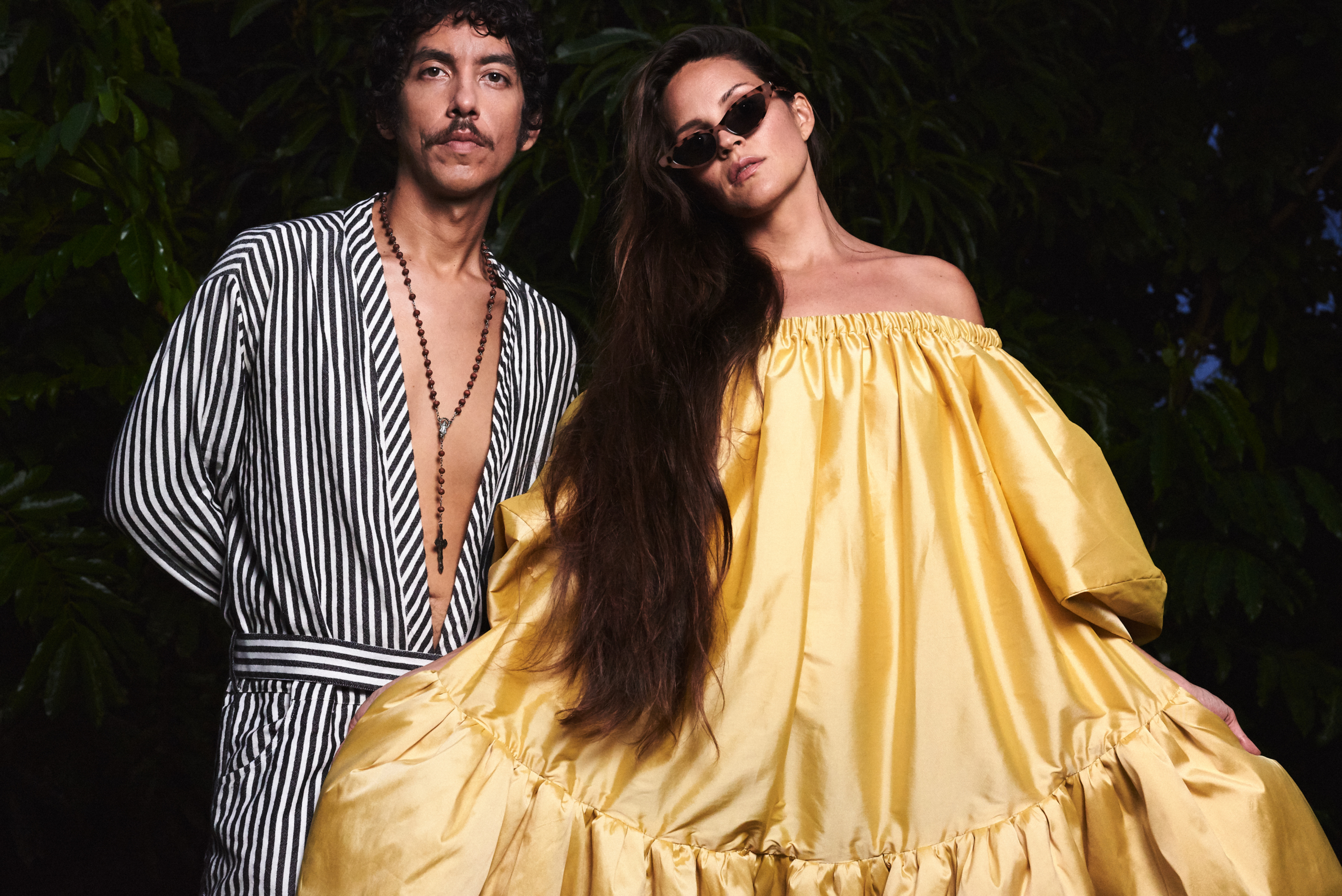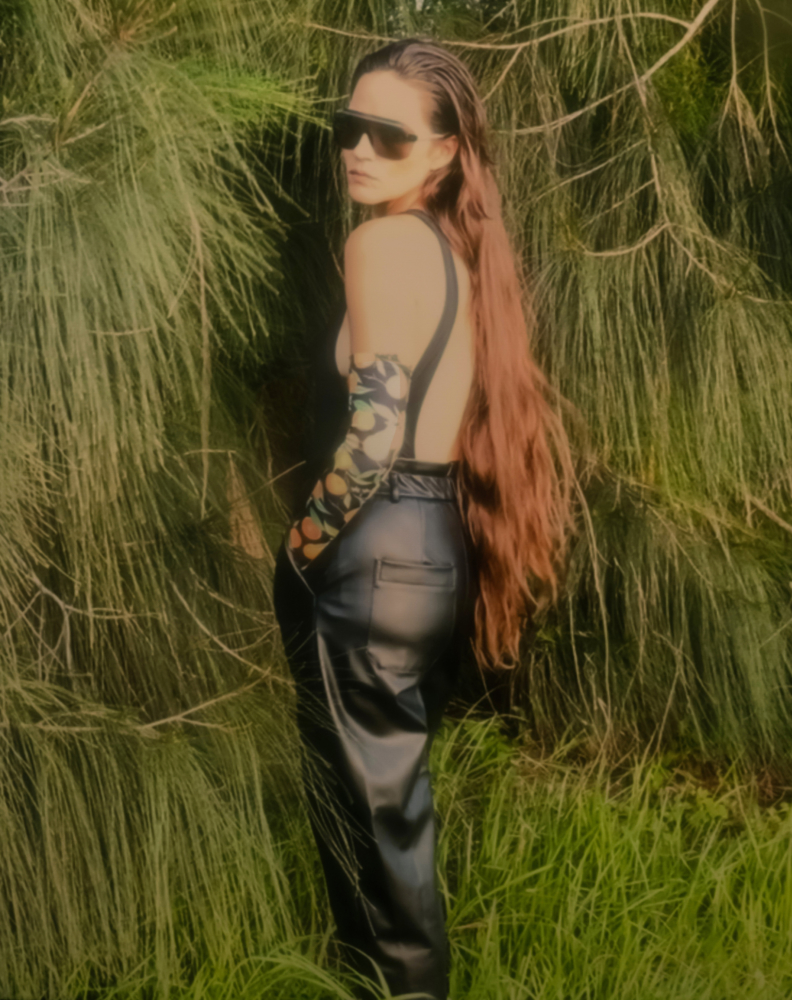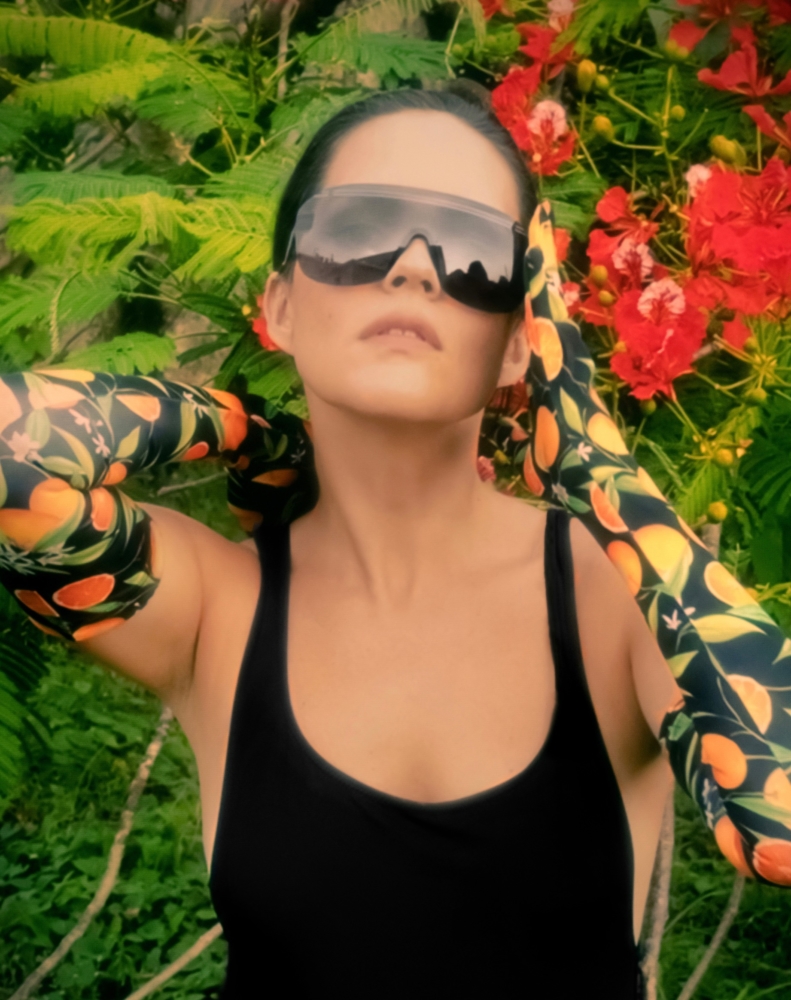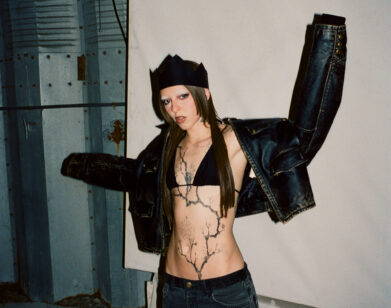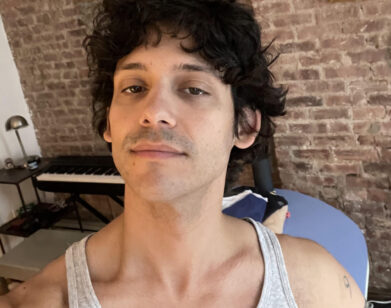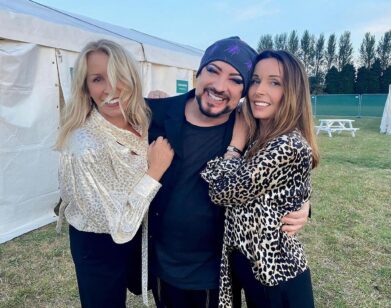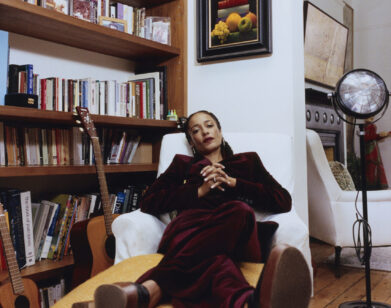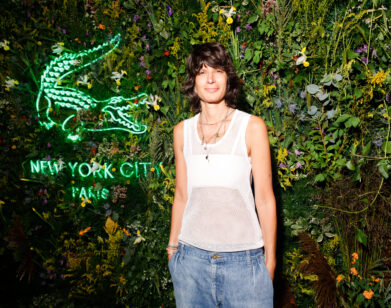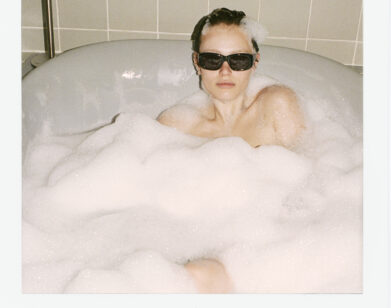add to queue
Buscabulla Is Using Music to Reclaim and Protect Puerto Rico
This is “Add to Queue,” our attempt to sort through the cacophony of music floating in the algorithmic atmosphere by consulting the experts themselves. Our favorite musicians tell us about their favorite music—the sad, the happy, the dinner party-y, the songs they want played at their funeral. In this edition, we speak with Raquel Berrios and Luis Alfredo del Valle, the Puerto Rican musical duo known as Buscabulla. With their first full-length album, Regresa, the husband and wife who met each other in New York while working on a Spanish cover of Lady Gaga’s “Bad Romance,” went back to their roots—quite literally—to create music that not only felt like Puerto Rico but celebrated the island’s rich culture and it’s influence on their lives both musically and personally. Their latest music video, “Mio,” is a stunning homage to Puerto Rico’s culture, its traditions, and natural beauty. But the song itself is a sort of wake up call to the threats facing La Isla del Encanto—gentrification, corruption, a struggling government, and greedy wealthy Americans. As Berrios puts it, “it’s a dangerous time.” From their home in Aguadilla, Buscabulla spent some time with Interview discussing their decision to move back home to create Regresa and all their musical influences—from the ’80s Spanish pop band Mecano to Dev Hynes, and George Michael’s “Too Funky.”
———
ERNESTO MACIAS: Nice to meet you guys. How’s it going, where are you?
RAQUEL BERRIOS: We’re in Aguadilla. Have you ever been to Puerto Rico?
MACIAS: Never. It’s a really sad story that I’ve never been.
BERRIOS: Aguadilla’s a two-hour drive from San Juan, and it’s right at the Northwestern tip of the island. We live in a spot that in the ’50s and ’60s used to be an Air Force base, and then they abandoned it. People slowly started buying the houses, and it’s kind of weird because the whole section of the island was closed out for the military and now it’s open. Everything is planned out in a really, I guess, smart way?
LUIS ALFREDO DEL VALLE: Do you remember that show Lost?
MACIAS: I do remember it, but I never watched it.
DEL VALLE: It’s like the creepy village in the Dharma Initiative, but cool.
MACIAS: Tell me how Buscabulla began.
BERRIOS: Buscabulla was born in New York City. Luis and I met at a friend’s party because we’re both Puerto Rican and Puerto Ricans find each other in the city. My background is in design, but I also worked in a Brazilian record store. I pretty much was a nerd and collected music, but never really believed that I could actually make or write it. After I worked at this record store, I slowly started sampling music and making weird demos, and that was around the time when I met Luis at the house party. My friend and I were trying to play a Lady Gaga cover in Spanish of “Bad Romance.” I didn’t know how to finish the song. I didn’t know the chords, and that’s when Luis showed up, and he’s like, “I know the rest of the chords in that song.”
MACIAS: Do you still have that demo? I would love to hear that.
BERRIOS: Yeah, I recorded it with a friend. The Spanish version is pretty insane. After that, Luis and I hit it off, started making music, and eventually fell in love. I think Luis just liked my ideas, and he thought that we could collaborate. Luis is a multi-instrumentalist. He had been in bands in Puerto Rico for a while. He already had musical chops, but it was only after I met him that I actually went and I put myself through piano lessons and music theory. We started collaborating, but never really ever expecting it to be what it is today. We just started making music organically, and then one day we did this Converse competition.
DEL VALLE: Like a battle of the bands.
BERRIOS: If you won, you got to work with Dev Hynes [Blood Orange] which we actually really love. I hate contests but I love Blood Orange. We applied, and what’s crazy is that we knew that we were one of the semi-finalists—that was literally the week when we found out we were pregnant.
MACIAS: I first listened to your music when I watched the documentary Mala Mala. From then on, I see the thread of your music all through everything that you’ve made, but Regresa is a departure. I know that there was a big decision involved in moving back to Puerto Rico, so why don’t you tell me what was so different about this project to all the other things that you’ve done?
DEL VALLE: Our life changed so drastically while we were making it. I think perhaps the other EPs were sort of discovery. We were in this environment in New York that was very exciting, and we were trying to merge the two worlds: Puerto Rico and New York. As soon as we got here, I think we had to focus on something more internal, more personal. It really did flow similar to the other records where it was just in our bedroom working on this music endlessly. But we did other things—we would pull up the carto a cool lake or scenery and just record demos of tracks right then and there.
BERRIOS: In our mobile studio.
DEL VALLE: Some of that stuff that we recorded in different sceneries throughout the island is on the record. I think it’s, more than anything, a very inward-looking record. We were just affected by how heavy it was to really move back home, which is something we’d wanted to do since we met.
BERRIOS: It’s definitely a really big emotional ride for us, but also I feel it’s a transition record in terms of our sound, where we take all these things that we explored from EP I and EP II, the whole New York influence: disco and R&B and all of these genres that are a big part in the New York scene. We wanted to give it more of a Caribbean flavor and study more the rhythms of Puerto Rico and integrate them.
MACIAS: The further I moved away from my roots, the more I had this need to explore them and let them influence what I make, so I wonder how you see that? The fact that you were back home, how did that translated into the visuals or the people that you collaborated with?
BERRIOS: I lived in the States for 12 years, and New York City for 10. Luis was in New York City for eight years. Coming back is this weird thing between feeling that it’s your home, but also feeling like a tourist. I knew that wasn’t going to last for very long. I was so struck by everything. My mind had already gotten used to the streets and the subways. Every weekend we would go to some local town festivity and it was really fun to see the crazy dresses. There’s a lot of really old traditional celebrations. I was very touched by everything: the colors, the costumes, and even just the way that people are. Everybody’s so friendly, so different from New York City, and there’s also an edge. Puerto Rico is rough around the edges. It’s not a perfect place. It’s paradise, but we have a ton of problems out there. We have corruption, crime, the hurricanes, and we got earthquakes in January, and now the pandemic. It’s a paradise that is definitely very flawed, but in a way that really inspired me both visually and musically.
MACIAS: Tell me about your newest music video “Mio.”
BERRIOS: I feel “Mio” is maybe the one that shows the most what I’m talking about. Before we left New York, we started filming a documentary. We wanted to film this transition, so we literally filmed ourselves in New York during our farewell show. We did this show to gather money after hurricane Maria for musicians after hurrican Maria. We started filming a bunch of carnivals, community parties, and life out here in Puerto Rico. We realized that we could really make a video out of it. The video expresses a sense of ownership over a place that you’ve never felt was yours completely. Puerto Rico is a colony of the United States. Puerto Ricans in general, have a love-hate relationship with the island. I mean we love it because it’s literally paradise—
DEL VALLE: It’s our home.
BERRIOS: It’s where our families live. It has so many great things, but people hate it because we have such an inefficient government. We’ve been in an economic crisis for 10 years, so that’s also stirring up a bunch of stuff. Locals are leaving. Wealthy Americans are coming and buying land. “Mio,” in a way, talks about us trying to come back home and reclaiming that. It also talks about nature and how we have to really be vigilant in taking care of this place. Otherwise, it’s going to become Hawai or something like that where locals are not even locals anymore.
MACIAS: What is the last song that you listened to?
DEL VALLE: ”Best to You” by Blood Orange and Empress of. I was playing it for my daughter, and that’s one of her favorites.
BERRIOS: This is so funny because my last song is kind of crazy. Rickey Thompson was dancing to this song, and then I downloaded it and I actually included in a mixtape that I did. It’s a song by Cookie Kawaii, and it’s called “Vibe”— but the clean version.
DEL VALLE: Vibe, vibe, vibe.
MACIAS: It’s so infectious.
BERRIOS: I feel it does have a merengue type of energy.
MACIAS: What song nowadays doesn’t have a Latino influence in it? Our culture is pretty much everywhere on the radio right now. Do you have a song that you usually sing to no matter what or where you are?
BERRIOS: This might sound cheesy, but I always sing to “My Cherie Amour” by Stevie Wonder. There’s something about that song—it’s just so singable. Luis is not a big singer, though.
DEL VALLE: I just don’t have the pipes.
MACIAS: Who was the earliest musician to influence you?
DEL VALLE: I would say Charly Garcia, for me. He’s an Argentinian composer and has been in a bunch of huge Argentinian rock bands. He had this solo period in the ’80s. Since I was 12, I remember being in the car of my best friend’s dad’s car, and he would play us this record, and it was the wildest thing I’ve ever heard, and it sticks with me to this day.
BERRIOS: My mom had a pretty sick collection of forty-fives, and I guess I’m somewhere between George Michael or Sade.
- Raquel in the “Mio” music video.
- Photo by Supa Kid.
MACIAS: Those are pretty big influences. Are there any duos or bands that you feel heavily inspired by?
BERRIOS: I would definitely also say Mecano, a Spanish group.
MACIAS: My mom was obsessed with them. I think they have something really singular.
BERRIOS: Mecano has a beautiful influence. I would also say a lot of Argentinian music like Soda Stereo and even Juana Molina. We’ve also been super influenced by Juan Luis Guerra.
MACIAS: What’s your favorite song from him?
BERRIOS: I’ve really, really loved “Senales de Humo.” I think that song is just so beautiful, so hypnotic.
MACIAS: Do you recall the first concert you went to and who was playing?
BERRIOS: Probably Shakira or Mana. I probably saw Shakira in 1997 or something like that, which was a pretty good era for her.
DEL VALLE: For some reason he’s huge in Puerto Rico and has come here a bunch. The first concert I think I remember seeing was Sting with my big brother.
BERRIOS: You saw Sting? I want to see Sting.
DEL VALLE: He’s huge here.
MACIAS: Do you remember the first music video that left an impression on you?
DEL VALLE: “Waterfalls” by TLC. It’s so many story arcs in one video. It’s powerful.
BERRIOS: I’m just trying to think which one of the Madonna videos impacted me the most—but I’m going back to George Michael. He had that song called “Too Funky” and it was like a runway show with all these Thierry Mugler clothes. All those videos that he put out with all those supermodels in the nineties, I was really, really blown away by all of those videos.
MACIAS: What song that always puts you in a happy mood?
BERRIOS: There’s a song by Mary J. Blige that’s literally called “Be Happy,” and that song is the bomb. It always makes me feel really good.
DEL VALLE: Electric Light Orchestra. There’s one called “Mr. Blue Sky,” and that one just always puts me in a good mood.
MACIAS: What song makes you feel safe?
BERRIOS: Something by Fleetwood Mac.
DEL VALLE: I was going to say the same thing.
MACIAS: Okay, but which song?
DEL VALLE: “Landslide.”
BERRIOS: “Landslide” definitely makes you feel safe when you listen to it.
MACIAS: What songs would you put on a playlist to go to the beach?
BERRIOS: I would just play some pretty deep cut dub reggae. I would play Augustus Pablo, anything by him.
DEL VALLE: Shuggie Otis’s Inspiration Information record, that was a good one.
MACIAS: What about a getting-high playlist?
DEL VALLE: Well, we’re at the beach, so I would also play that. You know Wendy Carlos? She was a trans pioneer. She was the composer for the music in Clockwork Orange, and a lot of her music is very amazing synths.
MACIAS: What about a playlist to rebuild a community? I know that sounds heavy, but all your music sounds healing, so I wonder what helps you feel that.
BERRIOS: Some type of Nueva Trova, this movement of music that came out in the ’60s in the Caribbean, and it was mostly-folk singer-songwriters, but Silvio Rodriguez and Pablo Milanes, a lot of them are Cuban. In Puerto Rico we also had people like Roy Brown. It was mostly politically-edged, mostly for Puerto Rican independence. But those are the movements here that are always concerned with community building and grassroots efforts.
MACIAS: What song or album takes you back to your youth?
BERRIOS: Jagged Little Pill by Alanis Morissette, but I was also super into Sublime.
DEL VALLE: What’s the Story Morning Glory. I can’t not put that one in there. That first Backstreet Boys LP, classic Max Martin production. Still with us, he’s still putting out the hits. Love that guy. You can’t live without him.
MACIAS: If there was a song that you think could save the world, which would it be?
BERRIOS: Lately we’ve been listening to a lot of Ennio Morricone since he died, and, literally, I would listen to his music and cry.
DEL VALLE: No small task. “Sing” by the Carpenters. That one we just heard the other day.
BERRIOS: And “Ojala Que Llueva Cafe,” it always makes me cry.
MACIAS: You can answer individually or as a duo, however you want. If your life were a TV show, what would it be the theme song?
DEL VALLE: Can we just repurpose the one from Family Matters.
BERRIOS: Definitely, the theme song from Kirby, that’s a yes.

